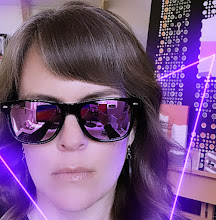So, artists and other creative folks using the internet is really not a new thing, but at the Museum School, sometimes it feels like it is. The last two days have been filled with colloquia that remind me of this, which is at once humbling and encouraging. Last night I attended the weekly CMS colloquium - A Site for Social Data Analysis - which hosted Fernanda Viegas and Martin Wattenberg of IBM's Visual Communication Lab. They talked about their latest research project, Many Eyes. I'm really fascinated by the idea of data visualization and can't wait to play with the site. I have some ideas of data I'd like to visualize (related to the art world, not surprisingly) but I'm having a harder time than I anticipated trying to "harvest" that information to upload. I'll let you know when I've reached some level of success.
Unlike Neal's program, the MFA program at the Museum School only hosts a colloquium, on average, once per semester. This semester we have two, both this month, the first of which - Photography in the Age of Digital Replication - was held today. Panelists included Oliver Warden, Barbara Pollock, and Wolfgang Staehle. I have some hang-ups with photography (in short, I feel sometimes like our "interdisciplinary" program is disproportionately heavy on artists that seem to really strongly identify as Photographers with a capital P, and - although this has shifted slightly this year - they just don't seem to get the same number of "why's" in their critiques, i.e. why photography as your choice of medium, why did you include that palm tree in the corner there, etc.) but I was pleasantly surprised at how diverse the panelists' work and views turned out to be in relationship to this topic. Warden strikes me as a super smart popular culture junkie and his paintings look pretty darn luscious. And Staehle founded thing.net "back in the day" (specifically 1991) as a bulletin board system. He commented in his presentation that this way of working was attractive to him at that time because the open dialogue and sharing of information contrasted sharply to the sort of closed, secretive world of contemporary art at the time. I feel like this is still true (which is why I've tried to find a community within the School that's more receptive to this way of working and love hanging out with MIT folks), but my community doesn't necessarily represent the art world at large, either. 
That said, I'm holding off until after the analog drop box is officially closed (next Tuesday) to post the Lost Object Project submissions I've received from fellow students, but I can tell you about a couple I do not plan to post and why. Basically, neither your virginity nor Western Civilization are objects (and I don't see how the latter is lost; I can't speak to the former). One of the obstacles I thought about in the beginning of this project was: what is the contributor getting out of it? Why should you take the time to submit your story and image (especially if you've gone to the trouble of creating your image from memory) when all you get back in return is a URL to a virtual memorial? That's probably not enough for a lot of people. With this in mind, one thing that's really great about Many Eyes is all the ways they let you link to or blog about the visualization you've created, altered, commented on, etc. It's still very much credited to Many Eyes but there's a little piece of it that feels like yours. That said, I wonder if part of this obstacle that I anticipated and sense in some of the responses I've received so far is because they're coming from artists who, perhaps, can't fully let go of their own artistic self expression needs in exchange for a slightly more selfless contribution.
It's tricky because I certainly don't want to censor what's submitted, but as moderator of the project, in some cases I've already decided that the spirit of the project is more important than exploring the medium as fully democratic and open. And I've linked to similar projects with different conceptual interests so if you want to talk about loss as it relates to non-objects, hopefully you'll find a place to do so. And if not, you're an artist; create your own interactive project!
3.09.2007
western civ 101
Posted by Becky G. at 3/09/2007 01:11:00 PM
Subscribe to:
Post Comments (Atom)




No comments:
Post a Comment